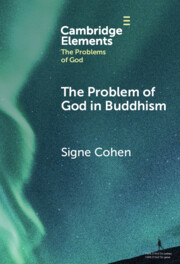Refine search
Actions for selected content:
119 results
Chapter 9 - Hume’s Dialogues and Habits of Religion
- from Part I - Hume’s Dialogues
-
-
- Book:
- Hume's <i>Dialogues Concerning Natural Religion</i>
- Published online:
- 25 December 2025
- Print publication:
- 31 January 2026, pp 159-178
-
- Chapter
- Export citation
Chapter 2 - Hume’s Dialogues and Intelligent Design
- from Part I - Hume’s Dialogues
-
-
- Book:
- Hume's <i>Dialogues Concerning Natural Religion</i>
- Published online:
- 25 December 2025
- Print publication:
- 31 January 2026, pp 28-45
-
- Chapter
- Export citation
Chapter 10 - Ambiguity and ‘Atheism’ in Hume’s Dialogues
- from Part I - Hume’s Dialogues
-
-
- Book:
- Hume's <i>Dialogues Concerning Natural Religion</i>
- Published online:
- 25 December 2025
- Print publication:
- 31 January 2026, pp 179-196
-
- Chapter
- Export citation
Chapter 7 - The Misery and Wickedness of Man
- from Part I - Hume’s Dialogues
-
-
- Book:
- Hume's <i>Dialogues Concerning Natural Religion</i>
- Published online:
- 25 December 2025
- Print publication:
- 31 January 2026, pp 121-139
-
- Chapter
- Export citation
Chapter 1 - Hume and the Argument from Design
- from Part I - Hume’s Dialogues
-
-
- Book:
- Hume's <i>Dialogues Concerning Natural Religion</i>
- Published online:
- 25 December 2025
- Print publication:
- 31 January 2026, pp 11-27
-
- Chapter
- Export citation
Chapter 20 - Plutarch
- from Part III - Individuals
-
-
- Book:
- Personal Religion in the Ancient Greek World
- Published online:
- 25 November 2025
- Print publication:
- 11 December 2025, pp 452-466
-
- Chapter
- Export citation
Chapter 1 - From Anomaly to Transgression
- from Part I - Contexts and Perspectives
-
-
- Book:
- Personal Religion in the Ancient Greek World
- Published online:
- 25 November 2025
- Print publication:
- 11 December 2025, pp 27-46
-
- Chapter
-
- You have access
- HTML
- Export citation
Is theism compatible with pointless non-resistant non-belief?
-
- Journal:
- Religious Studies , First View
- Published online by Cambridge University Press:
- 25 November 2025, pp. 1-17
-
- Article
-
- You have access
- Open access
- HTML
- Export citation
Non-resistant non-belief is pervasive
-
- Journal:
- Religious Studies , First View
- Published online by Cambridge University Press:
- 28 October 2025, pp. 1-21
-
- Article
-
- You have access
- Open access
- HTML
- Export citation
7 - The Religiously Unaffiliated and Seculars
- from Part II - Religious Traditions
-
- Book:
- Civil Religion and the Renewal of American Politics
- Published online:
- 09 October 2025
- Print publication:
- 23 October 2025, pp 133-154
-
- Chapter
- Export citation
An interview with Graham Oppy
-
- Journal:
- Religious Studies , First View
- Published online by Cambridge University Press:
- 24 July 2025, pp. 1-10
-
- Article
- Export citation
Chapter 14 - Religion
- from Part II - Social Contexts
-
-
- Book:
- Sean O'Casey in Context
- Published online:
- 23 June 2025
- Print publication:
- 10 July 2025, pp 150-158
-
- Chapter
- Export citation
Should atheists be worried about modal Calvinist epistemology?
-
- Journal:
- Religious Studies , First View
- Published online by Cambridge University Press:
- 16 June 2025, pp. 1-17
-
- Article
-
- You have access
- Open access
- HTML
- Export citation
Chapter 24 - Religion
- from Part II - Intellectual, Cultural, and Political Contexts
-
-
- Book:
- Percy Shelley in Context
- Published online:
- 17 April 2025
- Print publication:
- 24 April 2025, pp 180-186
-
- Chapter
- Export citation
GREEK ATHEISM: A MIRAGE
-
- Journal:
- Greece & Rome / Volume 72 / Issue 1 / April 2025
- Published online by Cambridge University Press:
- 18 March 2025, pp. 88-108
- Print publication:
- April 2025
-
- Article
- Export citation
2 - The Problem of the Great All-Knowing Answer Man
-
- Book:
- The Greatest of All Time
- Published online:
- 23 January 2025
- Print publication:
- 06 March 2025, pp 47-80
-
- Chapter
- Export citation

The Problem of God in Buddhism
-
- Published online:
- 17 February 2025
- Print publication:
- 13 March 2025
-
- Element
- Export citation
Pointless atheism
-
- Journal:
- Religious Studies / Volume 61 / Issue 3 / September 2025
- Published online by Cambridge University Press:
- 24 January 2025, pp. 590-597
- Print publication:
- September 2025
-
- Article
-
- You have access
- HTML
- Export citation
Chapter 7 - Schopenhauer’s Political World
-
- Book:
- Schopenhauer's Politics
- Published online:
- 09 January 2025
- Print publication:
- 23 January 2025, pp 220-243
-
- Chapter
-
- You have access
- Open access
- HTML
- Export citation
12 - Worship for Atheists
- from Part III - Normative Aspects
-
-
- Book:
- The Philosophy of Worship
- Published online:
- 09 January 2025
- Print publication:
- 23 January 2025, pp 209-226
-
- Chapter
- Export citation
